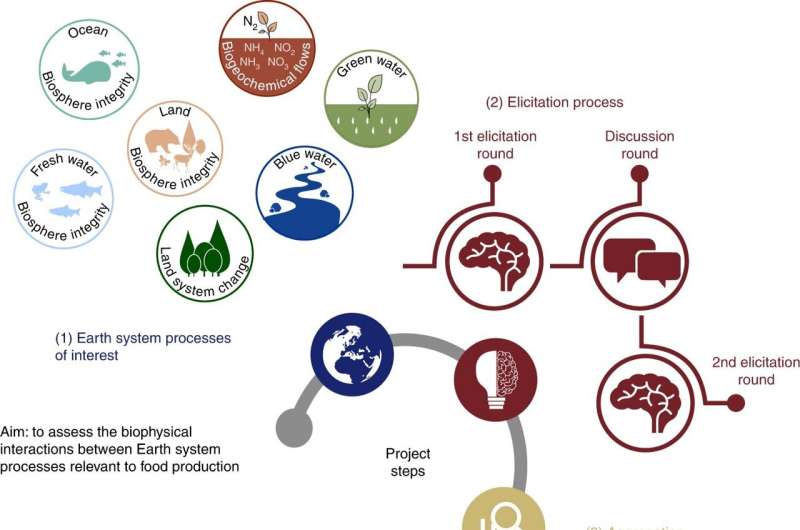Food production impacts Earth and its natural processes

Food production is already one of the biggest stressors to our planet, but it's made substantially more challenging by the interaction of Earth system processes, according to new research.
Earth system processes refer to the natural activities that keep the planet in a habitable and useful state. This includes processes occurring in the different biospheres like carbon sequestration in forests or nutrient run off into freshwater systems.
The interactions between these processes challenge their boundaries, and effect how well they function.
"Food production is a major cause of environmental stress, impacting on biodiversity loss, the climate and overexploitation of marine resources," co-author Dr. Steven Lade from The Australian National University said.
"We need to start producing food in a sustainable way. By assessing the interaction of Earth system processes we can ensure they are considered when designing and implementing food production and agriculture policy."
The research, led by Aalto University in Finland, examined and characterized various Earth system processes, highlighting how they can be used when working toward more sustainable food production techniques.
The study highlighted several pivotal interactions that are often overlooked, including the impact of green water on food production and biodiversity.
"Green water refers to the water stored in soil that is available for plants to grow. It has a central role to play in interacting with, and regulating all the other processes like land, biodiversity, and water flow," Dr. Lade said.
"Ensuring we address these various interactions will require action. We need better communication, meaning that authorities responsible for areas like agriculture policy and marine policy need to talk to each other.
"We need to take a holistic approach when it comes to managing sustainable food production so that it doesn't strain the boundaries of our natural systems. We need to look beyond just water and land as inputs for food production."
The researchers argue challenges stem from a high density of interactions between the ocean, fresh water and land biospheres.
"Acknowledgement of these interactions and boundaries is needed for maintaining stability and resilience in the Earth's system. In some instances, human pressures may have already pushed the Earth system beyond the safe operating space for humanity," Dr. Lade said.
"System interactions make sustainable food production more challenging. However, the interconnected nature means taking positive actions can have extensive flow on effects."
The study has been published in Nature Sustainability.
More information: Anna Chrysafi et al, Quantifying Earth system interactions for sustainable food production via expert elicitation, Nature Sustainability (2022). DOI: 10.1038/s41893-022-00940-6
Journal information: Nature Sustainability
Provided by Australian National University




















